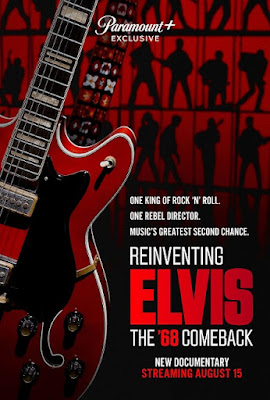Steve Binder has an unusual distinction. He directed two TV specials that now have their own feature documentaries. One was the Stars Wars Holiday Special that really shouldn’t have been a holiday special. The other was the Elvis Comeback Special, which “Col.” Tom Parker wanted to be a Christmas special, but Presley and Binder had other ideas. They won the artistic battles and were vindicated by the special’s smashing success. John Scheinfeld chronicles the behind-the-scenes drama and analyzes the special’s legacy in Reinventing Elvis: The ’68 Comeback, which premieres Tuesday on Paramount+.
Baz Luhrmann’s Elvis did a nice job covering the Comeback Special, which might have helped usher Reinventing Elvis through the pre-production process. When it first aired, it was titled Singer Presents…Elvis, but now it is known as The ’68 Comeback Special. Regardless, Singer sewing machines was the lead sponsor. Admittedly, they do not sound very rock & roll, so maybe we can understand why Parker thought they wanted Christmas carols. However, the rest of America and Steve Binder wanted the old dangerous, gospel and country loving rock & roll Elvis.
Parker is definitely the documentary’s villain. Scheinfeld’s graphic even label him as such. Presley is the “star” and Binder is the “hero.” Maybe not so coincidentally, Binder is also the executive producer. Regardless, he was definitely on the right side of history as far Presley fans are concerned and several of the dancers from the big production numbers all agree Binder was great to work with.
Of course, Presley was the star. Some of the talking heads make a good point when they argue the informal jam session performances Binder filmed were a precursor to MTV Unplugged. It is also cool to see the great Scotty Moore getting shout-outs from the King. One thing is certain—there is no arguing with the effectiveness and screen presence of Presley’s black leather jump suit. It did make him sweat, but it sounds like his female fans thought that was a good thing.






